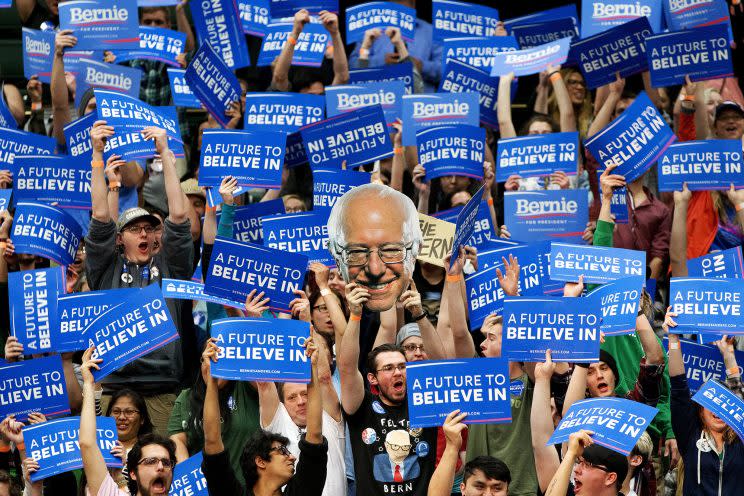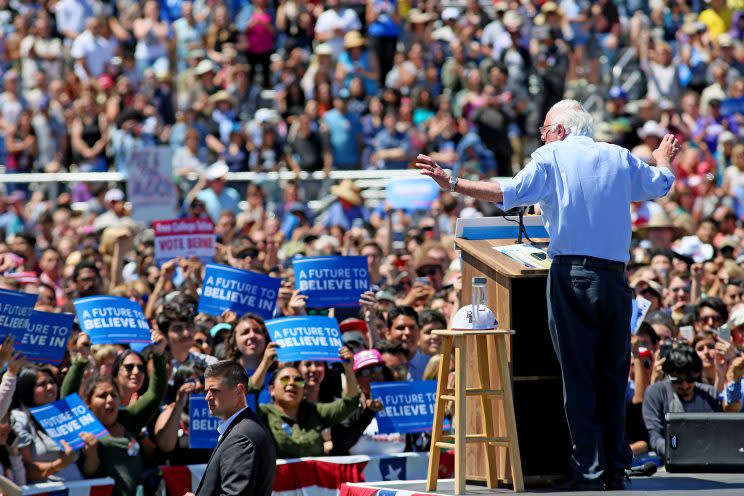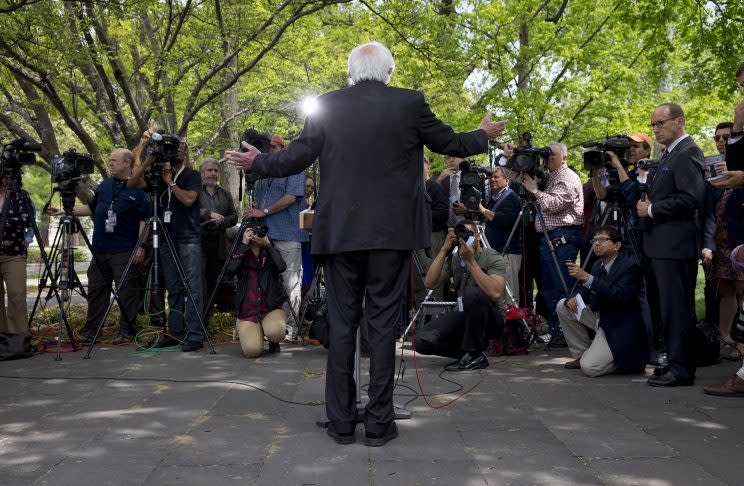Bernie Sanders’ farewell tour is approaching its end

The final, strange stage of Vermont Sen. Bernie Sanders’ presidential campaign appears as if it will be over next week.
Sanders is reportedly planning to endorse presumptive Democratic nominee Hillary Clinton at a Tuesday rally in New Hampshire. Such an endorsement would mark the end of Sanders’ slow exit from the presidential race, a long goodbye that confused and angered some Democrats who argued his protracted concession posed a threat to party unity.
Clinton entered the race widely perceived as the inevitable Democratic nominee, but Sanders went from a distant long shot to a surprisingly strong contender who won in 22 states. Nevertheless, the primary essentially ended on June 14, when Clinton secured enough delegates to lock up the party’s nomination.
But in recent weeks, as the results became increasingly clear, Sanders steadfastly refused to give up.
Sanders, with an unclear path toward the nomination, spent the last period of his improbable, not-quite-campaign facing a barrage of questions about when he would drop out and what he was hoping to accomplish by staying in.
Though Sanders kept running, his team began to lay the groundwork for his next move. His stated goal is influencing the Democratic Party platform, a list of policy proposals and statements about values that the party will publicly commit to at its convention this month. But Sanders’ exact plan for exerting influence on the party remains somewhat unclear, and there are some strategic disagreements among his allies.
A Democratic operative who has been involved in conversations with the Sanders campaign said there were talks about a post-campaign organization headed by Sanders. The operative requested anonymity in order to candidly provide details of these private deliberations about what the campaign’s “going forward structure should look like.” Though these conversations had taken place, the operative said firm plans had not been made as of late last month.
“From what I can gather, they haven’t yet made a decision,” the operative said of the Sanders campaign.
An organization along the lines of President Obama’s Organizing for Action would allow Sanders, a fundraising powerhouse, to tap into his donor and email lists. The operative said Sanders could use this group to back like-minded progressive candidates and build a power base in the Senate. It could also be used to support his policy agenda, including opposing the Trans-Pacific Partnership (TPP) trade deal and tax policy negotiations.

When Sanders came to New York on June 24, Yahoo News asked the candidate’s top spokesman and longtime adviser Michael Briggs about the campaign’s future plans. Briggs said he was unsure whether Sanders would launch a post-campaign political organization. However, he said Sanders wants to “figure out ways to transfer the energy that a lot of people have supplied to his campaign to other candidates.” Briggs also stressed that Sanders is eager to influence the Democratic Party platform.
“I don’t know that there will be that much discussion of a new organization, but there will be a discussion about all of the policy issues he thinks that the party ought to embrace as part of welcoming into the party fold the 13 million people who voted for him and are energized by his ideas,” Briggs said. “It will be good for the Democratic Party to figure out a way to welcome those people and those ideas.”
Sanders’ aides and delegates have spent the last few weeks negotiating and pushing for concessions in the platform. A draft version released July 1 included several parts of Sanders’ agenda, including a $15 minimum wage, expanded social security, tighter banking regulations, campaign finance reform and the elimination of private immigration detention centers. In a tweet, Sanders’ policy director Warren Gunnels called these things “huge victories.” However, in an op-ed published on July 3, Sanders argued that the party platform still “needs work” and stressed the need for further change, including clearer language on the $15 minimum wage, a ban on hydraulic fracturing, a carbon tax and opposition to the TPP trade deal.
“Let us be clear, this is a document that needs to be significantly improved by the full Platform Committee meeting in Orlando on July 8 and 9,” Sanders wrote.
On Friday, the night of July 8, Sanders’ campaign fired off a press release announcing that the senator had “scored a big victory” in Orlando: a plank on the Democratic platform backing a $15 minimum wage indexed to inflation.

Yahoo News reached out to the Sanders campaign to discuss his future plans. His team arranged an interview with campaign manager Jeff Weaver before abruptly canceling.
Weaver, who has spent decades working with Sanders and is the senator’s closest aide, is playing a key role as the campaign determines how to move forward. During the primary, Weaver became somewhat of a polarizing figure among Democrats for attacking the Democratic National Committee and its chairwoman, Rep. Debbie Wasserman Schultz, for their alleged bias in favor of Clinton.
The operative who discussed Sanders’ post-campaign plans attributed the decision for the campaign to be “at war with the DNC” to Weaver and argued that the strategy was a mistake for Sanders and his ambition to influence the party long term.
“If you have a vision of becoming the nominee, once you are the nominee, you own the party apparatus. There has to be a sense that, ‘Even if I have this grievance and this was wrong, I have to own this and run it some way,’” the operative said.
The operative said the campaign’s focus on disputes with the DNC left an “unanswered question.” It’s one shared by multiple members of Sanders’ own team.
“If this had been managed differently, could Bernie have pulled this off?” the operative asked.


